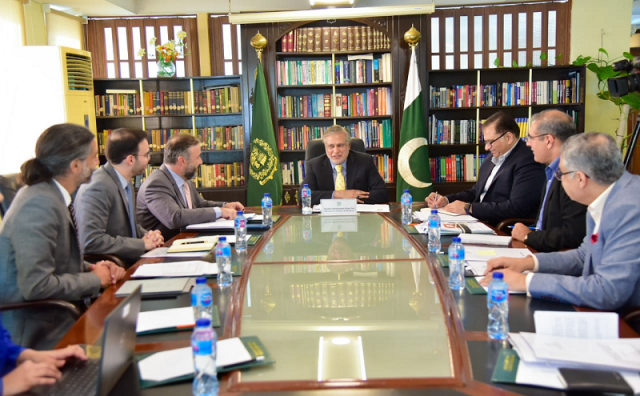Dar faces uphill task to unlock $1b WB loans
Finance minister assures lender’s local head that country will implement prior conditions

Pakistan on Saturday assured the World Bank to timely implement prior actions for over $1 billion budget support loans amid the country's inability to create consensus among all the domestic stakeholders and narrowing political space to take difficult steps.
The assurance has been given by Finance Minister Ishaq Dar two days before his departure to Washington, where he is expected to participate in a high-profile conference on the sidelines of the World Bank (WB) and International Monetary Fund (IMF) annual meetings.
The conference will be co-chaired by the World Bank Group and an important Group-7 member, the UK, aimed at bagging the world’s financial support for Pakistan’s flood-affected population.
The conference has been arranged ahead of the international donors conference that is expected to take place in Paris and being hosted by the French president to garner assistance for Pakistan.
Dar met with Najy Benhassine, the country director of the WB, and discussed his forthcoming meetings in Washington.
They include one with the WB president.
“The finance minister assured Najy Benhassine and his team of meeting prior actions for timely completion of programmes,” read a statement issued by the finance ministry after the meeting.
An audience with WB President David Malpass might help in receiving concessions but Dar’s meeting with IMF Managing Director Kristalina Georgieva so far remains tentative due to scheduling issues.
Pakistan is seeking the approval of $450 million second Resilient Institutions for Sustainable Economy (RISE-II) budget support loan by January next year.
It will also unlock a $450 million loan from the Asian Infrastructure Investment Bank (AIIB).
The government has also budgeted a $600 million second Programme for Affordable and Clean Energy (PACE-II) loan but it expects to receive this money at some later stage of the fiscal year because of the tough conditions attached to it.
However, the WB is pushing to simultaneously implement the prior conditions of both these loans, which are tough and may further erode the government’s political capital.
The conditions for RISE-II loan pertain to the country’s fiscal and macroeconomic framework, involving the provinces too. The PACE-II loan is aimed at lowering the circular debt flow through reducing power generation costs, decarbonising the energy mix, improving efficiency in distribution, and retargeting electricity subsidies.
These steps would be politically unpopular.
Under PACE-II, the previous PTI government had committed to reopen the power purchase agreements (PPAs), including those signed with China. However, sources said the WB might give some time to implement this condition, provided Pakistan took other steps to improve the financial health of the power distribution companies and to reduce the circular debt that stood at Rs2.3 trillion by June this year.
Pakistan has to show at least an intent for some power sector reforms and take steps to reach a consensus on the integration of the sales tax on goods and services -- a task that required the consent of the Centre and provincial governments.
The sources said if the government was able to meet the conditions of the GST integration and a few power sector reforms, the WB might agree to decouple the approval of the RISE-II and the PACE-II.
The finance ministry has long been claiming that the RISE-II was at a much-advanced stage but still some actions remained pending.
The main stumbling block in the way of RISE-II loan is the lack of consensus among the Centre and four provincial governments over the harmonisation of GST on goods and services across the country.
Dar is expected to chair a meeting of the National Tax Council (NTC) on Monday before leaving for Washington to break the gridlock.
This time, the problem lies at the end of the Federal Board of Revenue (FBR), which is not accepting the definition of the services.
There is still a disagreement over the definition of what constitute a good and a service as the FBR is not willing to accept the provinces’ proposal to accept the definition being used for harmonised system codes.
The finance minister discussed with the WB local head the economic challenges, which the country was currently facing.
He said the present government was cognisant of these issues and taking pragmatic steps to remove bottlenecks to growth.
Benhassine briefed Dar on the WB's future cooperation with Pakistan.
He informed the finance minister that the WB was allocating $2 billion funds from its existing financed projects for emergency operations in flood-affected areas to support Pakistan.
He further informed Dar that around $1.5 billion funds would be mobilised this year because of the emergency situation.
Benhassine informed journalists on Thursday that he had requested the WB headquarters to advance the disbursement of Pakistan’s share of the concessional lending to meet the additional financing needs.



















COMMENTS
Comments are moderated and generally will be posted if they are on-topic and not abusive.
For more information, please see our Comments FAQ